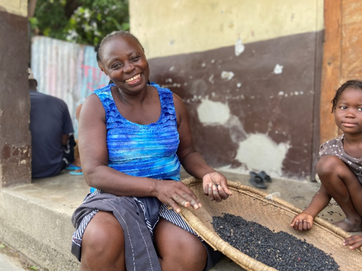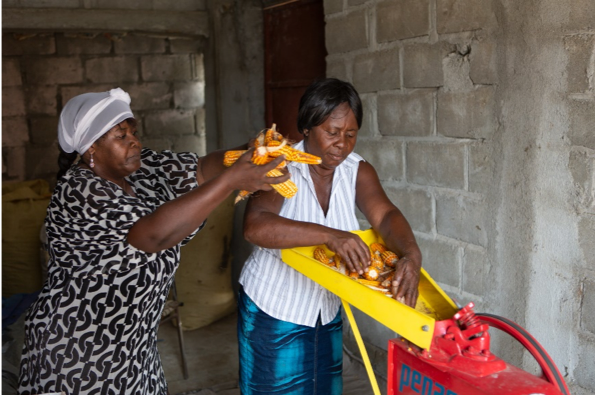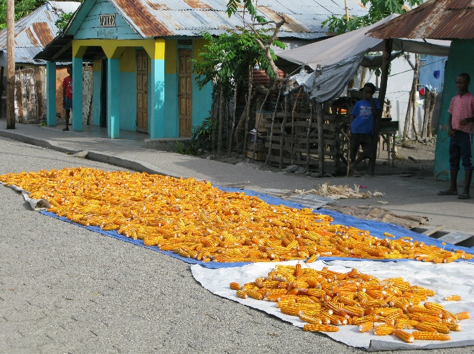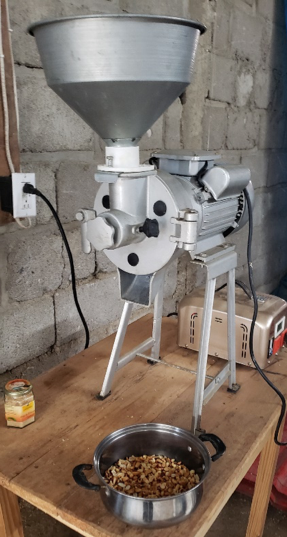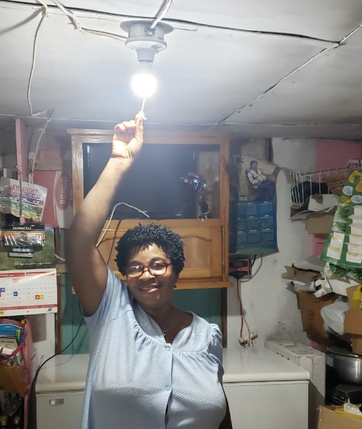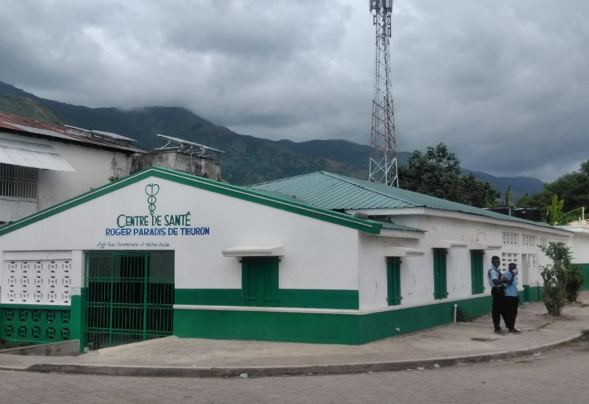Powering livelihoods and community services through productive uses of energy
|
The arrival of reliable microgrid electricity is a life-changing experience for people in their homes.
Beyond those benefits, microgrids can also open important new opportunities for entrepreneurs. From tiny home-based businesses to international telecommunications companies, many businesses operating in rural Haiti can benefit from access to newly reliable and affordable electricity. Strengthening local businesses and local community services is a critical part of EarthSpark’s operations. “Kilowatt-hours themselves are useless, it’s what people do with electricity that matters,” the EarthSpark team will often say. Truly unlocking local economic potential is not always as simple as offering an electricity connection. That’s why EarthSpark and Enèji Pwòp have a practice of ‘business accompaniment’. Learning from and working alongside local entrepreneurs to understand their specific opportunities and constraints, the EarthSpark team helps businesses access and adapt global best practices in electricity-powered processes. There is much talk in the international community now of “productive use of energy” (PUE) which is a newish name for what EarthSpark has been doing for years: working with local community members to expand their opportunities with the arrival of electricity. Below are some examples of the current productive uses of energy currently supported by EarthSpark’s microgrids as well as some new opportunities we hope to pilot in the near future. |
Pictured above: Fishers in Les Anglais now use rechargeable lights for night fishing.
|
Agricultural Production and Processing
In Haiti, over 75% of the population relies on agriculture for income, and the sector constitutes 24% of the national economy. Despite this, farm productivity has declined 12% over the past 20 years because of limited investment, lack of inputs, limited access to technology, natural disasters, and reliance on rainfed crops. Post-harvest losses are also considerable (upwards of 35-50% for some crops) as farmers lack capital for processing equipment leaving a limited ability to dry, store, process, refrigerate, or preserve their goods. Further, agricultural processing is mainly a manual process and overwhelmingly done by women. This labor is physically demanding, largely unpaid, and can take several hours each day which could otherwise be spent on other income activities or leisure.
All of this highlights a key pathway for affordable and reliable power from microgrids can unlock critical value and opportunity in a variety of agricultural value chains.
In Haiti, over 75% of the population relies on agriculture for income, and the sector constitutes 24% of the national economy. Despite this, farm productivity has declined 12% over the past 20 years because of limited investment, lack of inputs, limited access to technology, natural disasters, and reliance on rainfed crops. Post-harvest losses are also considerable (upwards of 35-50% for some crops) as farmers lack capital for processing equipment leaving a limited ability to dry, store, process, refrigerate, or preserve their goods. Further, agricultural processing is mainly a manual process and overwhelmingly done by women. This labor is physically demanding, largely unpaid, and can take several hours each day which could otherwise be spent on other income activities or leisure.
All of this highlights a key pathway for affordable and reliable power from microgrids can unlock critical value and opportunity in a variety of agricultural value chains.
For example, Association des Femmes Vaillantes des Anglais (AFEVA/ SUD) is a large women’s agricultural cooperative in Les Anglais that EarthSpark has partnered with previously to provide technology solutions, microcredit loans, and technical capacity building for agricultural processing including a corn de-kernelling machine and a peanut mill. This de-kernelling operation is the small primary income stream for AFEVA/SUD and represents the first step towards building a larger more profitable agricultural model for the cooperative and its members.
There are a number of other key value chains in Haiti that EarthSpark is working to find partners and innovation financing to support co-development of solutions with local cooperatives, associations, and entrepreneurs, including, but not limited to the following activities:
There are a number of other key value chains in Haiti that EarthSpark is working to find partners and innovation financing to support co-development of solutions with local cooperatives, associations, and entrepreneurs, including, but not limited to the following activities:
- Crop drying, particularly for breadfruit and other cultures like beans, cocoa, mangoes, and coconut, to reduce crop spoilage and increase food availability
- Milling, shelling, grinding husking, dekernelling, and threshing to help reduce processing times and drudgery, particularly for women, for staple crops like grains, spices, peanuts, beans, legumes, corn, rice, and more.
- Flour making, for corn, grain, and breadfruit flours to extend the shelf-life of local crops and create new value streams for bakeries, restaurants, and other operations
- Cold storage, fish drying and milling to support local fisheries extend the life and value of their catch
- Oil pressing, particularly for castor oil and moringa oil which are both have growing demand locally and globally as hair/massage oils
- Winemaking is a niche, but valuable and growing enterprise in rural communities in Haiti with significant potential to grow
- Poultry and egg production represents a small but growing
- Dairy production, while limited currently in rural Haiti presents an interesting opportunity for agricultural cooperatives to create additional value and revenue streams if markets can be established for local products
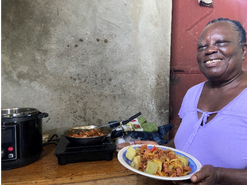 A Les Anglais customer shows off an electric kitchen and freshly cooked meal in Les Anglais A Les Anglais customer shows off an electric kitchen and freshly cooked meal in Les Anglais
Food/Drink Production and Preservation
Freezers and cold storage are cornerstone PUE applications for both individual household consumption as well as for commercial applications like storing crops, fish, drinks for sale directly and at local weekly markets. EarthSpark’s microgrids currently supports freezers and cold storage for well over 100 customers and freezers remain the most requested appliance in pre-development surveys. Further, the potential for centralized ice-making plants presents an exciting opportunity to expand access to cold chain and cold storage in rural communities even beyond the footprint of the microgrids, while also strengthening the microgrid operations business model by growing daytime energy consumption with a relatively flexible load. Another growing innovation for EarthSpark’s microgrids is the recent research and focus on electric cooking. EarthSpark is currently working to expand its electric cooking work to develop electric cooking solutions for commercial food vendors and restaurants as well as institutional cooking for hospitals, schools, and places of worship. |
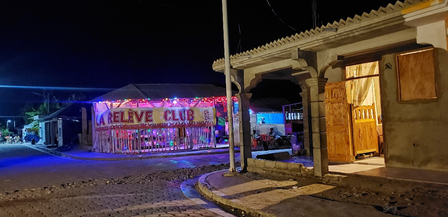 La Releve nightclub in Les Anglais
La Releve nightclub in Les Anglais
Other Local Small and Medium Enterprises
Identifying potential to support new and improved incomes and livelihoods is a core focus of EarthSpark’s pre-development work as it plans future microgrids. Currently, EarthSpark microgrids support a variety of small and medium enterprises across its two grids including but not limited to local hotels, carpentry, bars, barbershops, restaurants, home-based vendors, phone-charging services. As the microgrid model continues to expand EarthSpark plans to continue working with local enterprises and entrepreneurs to identify and integrate new solutions and appliances into its service including, but not limited to welding, ironing, clothes alteration and tailoring, banks, and digital services.
Identifying potential to support new and improved incomes and livelihoods is a core focus of EarthSpark’s pre-development work as it plans future microgrids. Currently, EarthSpark microgrids support a variety of small and medium enterprises across its two grids including but not limited to local hotels, carpentry, bars, barbershops, restaurants, home-based vendors, phone-charging services. As the microgrid model continues to expand EarthSpark plans to continue working with local enterprises and entrepreneurs to identify and integrate new solutions and appliances into its service including, but not limited to welding, ironing, clothes alteration and tailoring, banks, and digital services.
|
Healthcare, Telecommunications, and Other Community Services
As part of a collaboration with GSMA Mobile for Humanitarian Development Fund EarthSpark connected three telecommunications towers from national telecoms providers, Digicel and Natcom, to the microgrids in Tiburon and Les Anglais. In doing this, EarthSpark is improving the resiliency and reliability of local telecommunications services by eliminating their reliance on vulnerable diesel supply chains while also strengthening the microgrid operations business model by adding additional customers. Following the August 2021 earthquake, EarthSpark also developed a solar+storage solution to power the health dispensary in the town of Tiburon. This represented EarthSpark’s first small step into supporting healthcare providers, followed soon thereafter by a decision to connect the Les Anglais health clinic to the Les Anglais microgrid. EarthSpark is seeking support to similarly power health clinics and hospitals in future microgrid communities. EarthSpark also supports a number of schools and local government institutions across its two microgrids with more planned in future microgrid towns. |
Other Innovation
EarthSpark is always exploring new innovation and potential solutions unlocked by the arrival of reliable electricity. We're currently looking ahead to including electric mobility (i.e. electric motos, electric bicycles, electric trucks and utility vehicles) to help support both grid operations and customer mobility, particularly in the face of the all-too-common diesel and fuel shortages that frequently occur in Haiti.
EarthSpark is always exploring new innovation and potential solutions unlocked by the arrival of reliable electricity. We're currently looking ahead to including electric mobility (i.e. electric motos, electric bicycles, electric trucks and utility vehicles) to help support both grid operations and customer mobility, particularly in the face of the all-too-common diesel and fuel shortages that frequently occur in Haiti.

